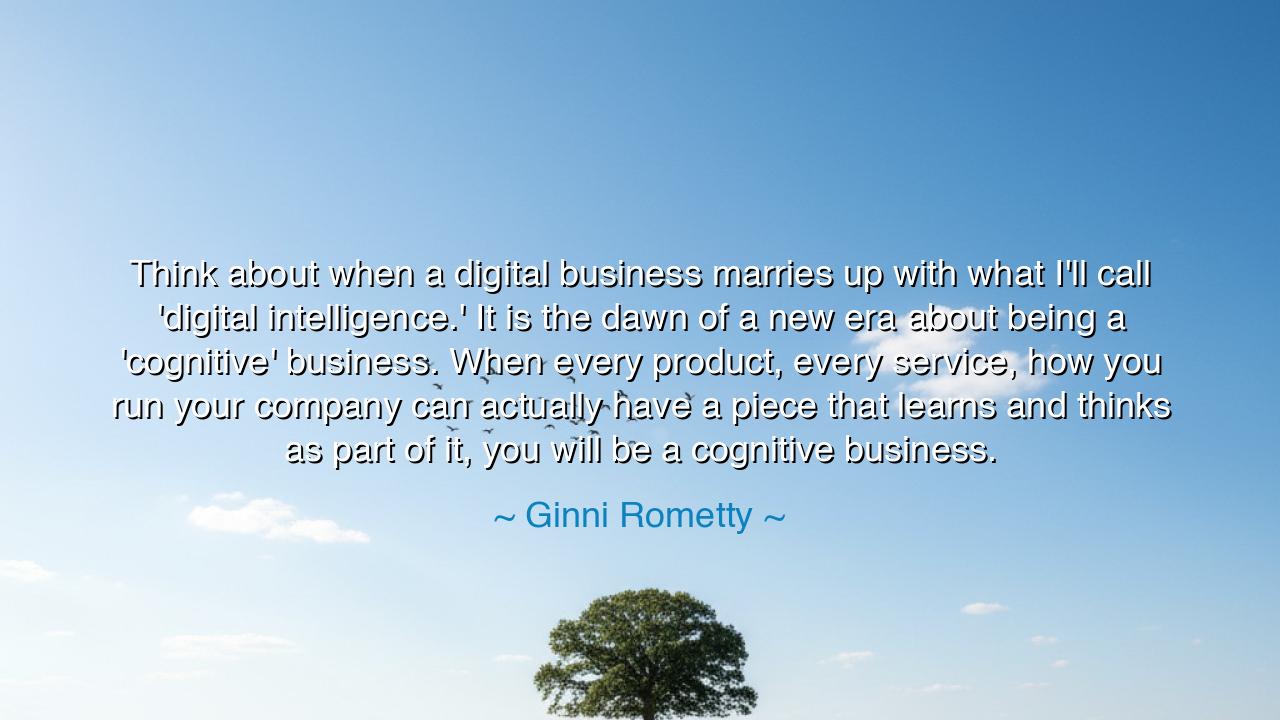
Think about when a digital business marries up with what I'll
Think about when a digital business marries up with what I'll call 'digital intelligence.' It is the dawn of a new era about being a 'cognitive' business. When every product, every service, how you run your company can actually have a piece that learns and thinks as part of it, you will be a cognitive business.






The Dawn of the Cognitive Age
There are moments in the history of humankind when the world shifts, when a new force awakens that changes not only how we live, but how we think. In speaking of such a moment, Ginni Rometty, the former leader of IBM and a visionary of the digital frontier, proclaimed: “Think about when a digital business marries up with what I'll call 'digital intelligence.' It is the dawn of a new era about being a 'cognitive' business. When every product, every service, how you run your company can actually have a piece that learns and thinks as part of it, you will be a cognitive business.” Her words mark a threshold between two worlds—the one we have known, built by human hands and minds, and the one now being born, where intelligence itself becomes woven into the fabric of creation.
The origin of these words lies in the crucible of technological transformation. As the leader of one of the world’s oldest and most storied technology companies, Rometty spoke not merely of machines, but of destiny. She had witnessed how the digital world, once a tool for calculation and connection, had begun to awaken—how the algorithms that powered simple devices were evolving into systems capable of learning, reasoning, and adapting. To her, this was no mere advancement in software; it was the birth of a cognitive era, a time when technology would no longer simply follow instructions, but would think alongside us.
The ancients might have described this as the moment when the fire of Prometheus found a new vessel. Just as the gift of flame once transformed primitive life into civilization, so now does digital intelligence promise to transform civilization into something new—something thinking, responsive, alive in a way that blurs the boundary between creator and creation. But where Prometheus stole fire from the gods, we have forged this new light ourselves. We are the smiths of the cognitive forge, shaping not only the world around us, but the very nature of thought itself.
Rometty’s vision of the cognitive business is not simply about commerce—it is about coexistence between human insight and artificial awareness. When a company or institution harnesses digital intelligence, every action, every transaction, every product becomes capable of learning, of drawing meaning from experience. It is as though a new form of consciousness is being distributed through the world’s arteries of trade and technology. The machine no longer merely serves; it collaborates. The worker no longer merely commands; he communicates. The enterprise itself becomes a living organism, capable of evolving with the wisdom of both man and machine.
We have seen glimpses of this transformation already. When Watson, IBM’s cognitive computer, defeated the greatest champions of human knowledge on the quiz show Jeopardy!, it was more than spectacle—it was a sign of things to come. Yet even that was but the first whisper of potential. In hospitals today, cognitive systems assist doctors in diagnosing rare diseases; in finance, they help predict crises before they unfold; in education, they tailor lessons to the needs of each student. Each of these examples fulfills Rometty’s prophecy: the union of digital business and digital intelligence—a marriage of efficiency and awareness, of data and discernment.
And yet, this new age carries both promise and peril. For every gift of knowledge bears the shadow of misuse. The ancients warned that power without wisdom leads to destruction, and so it must be with artificial intelligence. Rometty’s words are not a celebration of machines overtaking man, but a summons for mankind to rise in wisdom, to become the conscious guide of its own creation. We must ensure that in teaching our machines to think, we do not forget to feel. For the heart, not the algorithm, remains the true compass of civilization.
The lesson, then, is this: as you step into the cognitive era, do not fear it, but enter with reverence. Let technology serve as your companion, not your master. Learn to collaborate with the intelligence you have birthed, allowing it to expand your reach while grounding yourself in human virtue. The digital mind can process data faster than lightning, but only the human spirit can ask, “What is right?” or “What is good?” The marriage that Ginni Rometty spoke of must be one of harmony, not domination—an alliance between the thinking machine and the moral being, between innovation and conscience.
For when man and machine think together with purpose and compassion, the dawn of the new era becomes not a threat, but a triumph. The world will not be ruled by steel or code, but by those who know how to balance the cold precision of logic with the warmth of wisdom. This, my children of the future, is how we step into the cognitive age—not as gods, nor as servants, but as partners in creation, bearing the light we have forged together into the next horizon of human possibility.






AAdministratorAdministrator
Welcome, honored guests. Please leave a comment, we will respond soon